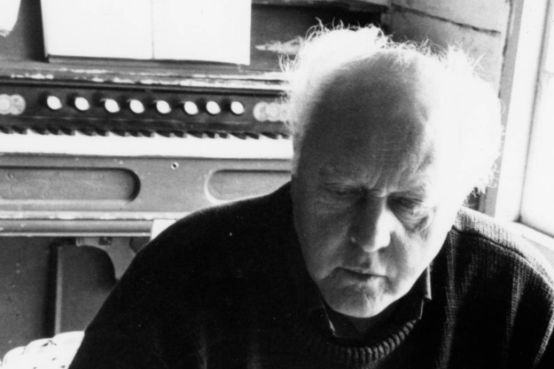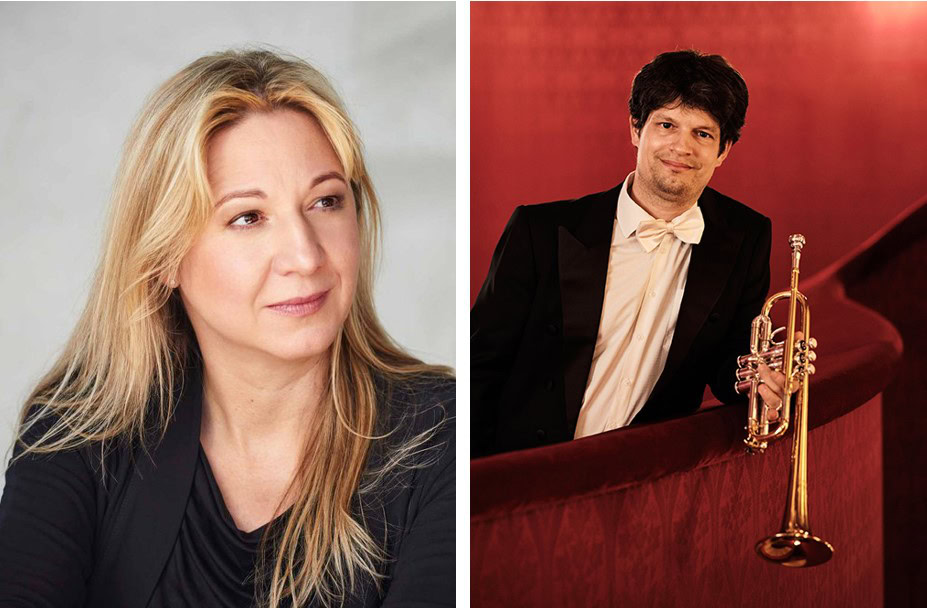Ingvar Lidholm
Ingvar Lidholm, one of the greatest Swedish composers of the 20th century, died on October 17, 2017 at the age of 96. He was not only one of the most important figures of the Swedish "choral miracle", but there are also points of contact with Switzerland.

The composer Ingvar Lidholm is particularly well known in choral circles in this country. He was a member of the Monday Group, which paved the way for the so-called Swedish choral miracle. The group also found inspiration in Basel.
Ingvar Lidholm, one of the greatest Swedish composers of the 20th century, died on October 17, 2017 at the age of 96. Following the deaths of Knut Nystedt (1915-2014) and Einojuhani Rautavaara (1928-2016), Lidholm is another highly significant Scandinavian composer of the 20th century.
Lidholm was a central figure in Swedish musical life for over 70 years and wrote groundbreaking works for choir, chamber music and orchestra. His work contributed significantly to the so-called "Swedish choral miracle", the emergence and movement of choirs capable of performing very difficult pieces. These pieces include Laudiwhich Lidholm composed at the age of 26, inspired by a choir conducted by his friend Eric Ericson. "Almost impossible to perform", was allegedly the verdict of the choir members when they got their hands on the sheet music in 1947.
Lidholm wrote a cappella works, solo works for clarinet, oboe and violoncello, but also orchestral works such as Contacion (1978) and Ritornello (1955) and operas like The Dutchmanfor which he received the Salzburg Opera Prize in1968, or A dream game (Ett drömspel, 1990). Other compositions by Lidholm have since become classics in the choral world, such as Canto LXXXI (1961), Libera me (1995) and a riveder le stelle (1973).
(For a detailed biography and list of choral works, see below).
The Monday group
A number of Swedish composers, musicians and musicologists got together in 1944 and met regularly on Mondays until around 1950 to discuss composition. The informal leader of the group was Karl-Birger Blomdahl (1916-68). The meetings took place in his family's apartment on Drottninggatan in Stockholm, with coffee provided by his mother.
As international contacts had been broken off due to the Second World War, there was a great need to exchange experiences. Among other things, they discussed the theory of movement and form with composers such as Hindemith, Bartók, Stravinsky, Schönberg and Berg. The core of the group consisted of Blomdahl himself, Klas-Thure Allgén, Sven-Erik Bäck, Sven-Eric Johansson, Hans Leygraf, Claude Génetay, Eric Ericson and Ingmar Bengtsson, as well as Ingvar Lidholm.
In 1946, several members of the group (Sven-Eric Bäck, Eric Ericson and Lars Edlund) traveled to Basel to the "Teaching and Research Institute" for Early Music to study with Ina Lohr. As Paul Sacher's assistant, Ina Lohr played an important role in establishing the institution now known as the Schola Cantorum Basiliensis. All her work was underpinned by a deep religiousness. She was involved in the Swiss singing movement and in the introduction of the rehearsal volume of the new church hymnal. At the same time, the early music movement was gradually seeking greater professionalization, wanting to free itself from the label of dilettantism that substantially defined house music, which contributed, among other things, to the fact that Ina Lohr's name is hardly known today.
When the Monday group started meeting again in 1947, several new participants joined, including Göte Carlid, Magnus Enhörning, Nils L. Wallin and Bo Wallner.
Paradigm shift in musical life
The orientation of the Montagsgruppe was, and became over time, more and more radically modernist music. The original aim was to improve their own compositions in parallel with the development of European art music. But they also wanted to work towards gaining more understanding for their own, often mocked music. In Sweden, they had to fight against the traditionalist music establishment, in which late romanticism and neoclassicism were the predominant stylistic ideals. The distancing from late Romanticism also included an interest in Baroque music and its performance practice among many members of the group.
The members of the Montagsgruppe took an active part in the debates on new music, gradually gaining more attention and more influence. And so gradually (after the group had already disbanded) some of its members, first and foremost Blomdahl, Bäck and Lidholm, occupied central positions within the Swedish music scene. The Monday Group is therefore of central importance in the Swedish music history of the 20th century and responsible for the clear aesthetic and stylistic paradigm shift in musical life during the 1950s and 1960s. Both Blomdahl and Lidholm became professors of composition at the Royal College of Music in Stockholm. Choral music in particular made a decisive contribution to the general development of new music in Sweden after the Second World War.
The enormous development of contemporary Scandinavian choral music itself, which is also known as the "Swedish choral miracle", is primarily linked to the choral conducting legend Eric Ericson. He not only inspired composers to write such new works. Above all, he also trained choral conductors who were no longer "afraid" of new sounds and unusual scores. In this way, he set a cycle in motion for subsequent generations in which capable choirs, excellently trained conductors and composers were able to fertilize each other.
Today, this influence is seen as both positive and negative. Other composers who did not share the group's ideals or who composed in a more traditional way were largely ignored by institutions such as Swedish radio, led by members of the Monday Group or their friends and "allies". This was described by composer Erland von Koch, among others, in his book Music and songs [Music and Memories], Stockholm 1989.
Biography and list of choral works
Source: Swedish Music Information Center
Ingvar Lidholm (1921-2017)
Born in Jönköping, in the southern Swedish province of Småland, on February 24, 1921, he studied violin with Hermann Gramms and orchestration with Natanael Berg as a high school graduate in Södertälje. From 1940 to 1945 he studied violin with Axel Runnqvist and conducting with Tor Mann at the Royal College of Music in Stockholm; from 1943 to 1945 he also studied composition with Hilding Rosenberg. He was a viola player at the Stockholm Opera from 1943 to 1947.
The prize of the Jenny Lind Fellowship enabled him to continue his studies in France, Switzerland and Italy. He was music director of the city of Örebro (1947-1956) and the first Swede to take part in the Darmstadt International Summer Course for New Music in 1949. In 1956 he became program director for chamber music at Swedish Radio. From 1965 he taught composition at the Royal College of Music in Stockholm, returning to the radio in 1975 as planning director for new music. From 1967 he was also editor of the journal New music. Vrom 1947 to 1951 and from 1963 to 1965 he was a member of the board of the Swedish Composers' Society. He was also Vice-President of the Royal College of Music in Stockholm from 1963 to 69 and a member of the board of the International Swedish Composers' Association.
He was awarded the Christ-Johnson Prize in 1958 and the International Koussevitzki Prize in 1965. In 1968, he was awarded the Salzburg Opera Prize for his composition The Dutchman excellent. He himself said about his composing: "I always try to keep in mind that my job is to make music speak ... Let's try to formulate music again that speaks strongly and directly to the listener, music for people of our time."
Ingvar Lidholm's early works reveal a subjective, Scandinavian romanticism (Gullberg chants 1944), even before long elements such as those of Hindemith or Bartók come into play (Concerto 1945, Music for strings 1952). The choral composition Laudi combines early vocal polyphony with modern harmony. Lidholm's musical language is rich and varied, the number of his works remarkable and his style versatile.
The international breakthrough came with the orchestral piece Ritornello. Vhis other pieces for orchestra, especially the ballet Riter (1959), Mutanza and above all Poesis (1964 for the 50th anniversary of the Stockholm Philharmonic Orchestra) should be mentioned. The latter is an unconventional piece for an anniversary, with brutal, differently colored blocks of sound, dynamic culmination points and absurd solo cadenzas for piano and double bass. Greetings from an old world was composed in 1976 for the Clarion Music Society of New York on the occasion of the bicentennial of the United States of America.
"I make use of tradition - with clearly understandable sound models with a gestural, virtuoso or melodic character." An important ingredient of the piece is Heinrich Isaac's Wanderlied Innsbruck, I have to let you go. The matching sister plant is Contacion (1979), which was composed on the occasion of a tour of the Soviet Union and incorporates Orthodox traditions in its sound. Probably no work of his has been more widely disseminated than Stamp Music. He wrote it in connection with the creation of a stamp to mark the bicentenary of the Royal College of Music in Stockholm.
List of choral works
Laudi (1947)
Four choirs (1953)
Two songs (1945-1955): 1st Saga (male choir) 2nd Jungfrulin (female choir)
Canto LXXXI (1956)
Motto (1959)
Two Greek epigrams (1959). 1st Kort är rosornas tid (3-part male choir), 2nd Phrasikleia (soprano solo and female choir)
Three Strindbergweisen (1959): 1st Välkommen åter snälla sol 2nd Sommerafton 3rd Ballad
Nausicaa alone (1963): Scene for solo soprano, choir and orchestra
a riveder le stelle (1971)
The Persians (1978): Dramatic scene for recitation and large male choir
Skaldens natt (1958/1981): For soprano solo, choir and orchestra
De profundis (1983)
from the opera Ett drömspel (A dream game): Vindarnas klagan (1981), Troget och milt (1990)
Inbillningens värld for male choir (1990/1996)
Libera me (1993-94)
from the opera Ett drömspel (A dream play): Vocal symphony (1997), Two madrigals (1981) both with orchestra
Madonnan's vaggvisa for solo voice and mixed choir (1943/2001)
Grekisk gravrelief (2003)
Herbert Blomstedt on Lidholm's Poesis
https://www.youtube.com/watch?v=PXJ9V453Zi8
https://www.youtube.com/watch?v=cPwVrjQgoxM








